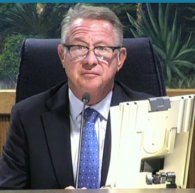IN PACKED HEARING, EL CAJON COUNCIL VOTES 3-2 AGAINST CONTENTIOUS IMMIGRATION RESOLUTION
By Miriam Raftery
View video of full Council hearing (Immigration agenda item begins at 37 minutes.)
January 29, 2025 – Emotions ran high during yesterday’s El Cajon City Council meeting, where a packed chamber heard testimony from 88 members of the public over a proposed over immigration enforcement resolution, followed by a heated Council debate that divided the all-Republican members during a hearing that ran over five hours.
The measure introduced by Mayor Wells, a revision from a version heard two weeks ago, aims to authorize El Cajon police to comply with federal immigration enforcement officials within the limits of state law and the Constitution for the purpose of removing violent criminals.
But the action comes on the same day that the White House Press Secretary indicated that the Trump administration views all undocumented immigrants as “criminals” even though crossing the border itself is a misdemeanor on the first offense, not a felony or violent crime.
Sweeps by Immigration and Customs Enforcement (ICE) have begun nationwide, picking up many immigrants with no criminal record—including an El Cajon man with no criminal record who was awaiting his asylum hearing when arrested this week by Immigration and Customs Enforcement (ICE) at his home in front of his five-year-old daughter, Councilman Michelle Metschel revealed in an impassioned speech.

 "I see this as disrespectful from you, the Council, the Mayor and the attorneys...This is going to create a lot of distrust in the community.” -- Jose Cruz, photo, left
"I see this as disrespectful from you, the Council, the Mayor and the attorneys...This is going to create a lot of distrust in the community.” -- Jose Cruz, photo, left